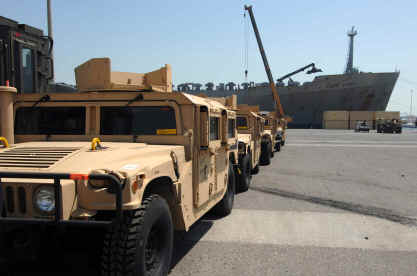As the 2008 economic crisis smashed the American economy, Congressional hearings were held about cost overruns relating to new construction at American military bases in Europe. Generals had convinced Congress that they needed hundreds of millions of dollars for new facilities in Germany. While Congressmen expressed alarm at rising costs, no one asked why the Army still maintained three combat brigades in Germany for post-World War II occupation duty, and over 10 years after the Warsaw Pact dissolved. This spending is a permanent economic stimulus to the German economy and employs thousands of Germans.
Madness in Germany
The U.S. Army's three combat brigades in Germany routinely
deploy to Iraq or Afghanistan for 12 months. This process begins as thousands of soldiers in the USA and their
families and household goods and cars are shipped to Germany for a three-year
tour with a combat brigade. After weeks to settle-in, they begin training for
the upcoming deployment. This forward-deployed brigade deploys yet again to a
war zone
for a year, leaving the expensively deployed families behind in Germany.
After the brigade returns to Germany, soldiers enjoy time off and await
orders to return to the USA, along with their family, furniture, and cars. It
would be far more cost effective to deploy these brigades from the USA, without
the costly family shuffle to and from Germany.
In 2004, Defense Secretary Donald Rumsfeld learned of this madness. He told Congress that reshaping the U.S. military's overseas base alignment makes sense because the Cold War is long over, and the move would allow the United States to better fend off its newest enemies. "We do not expect our forces to fight where they are stationed" Rumsfeld testified. "We know that our forces will need to move to the fight, wherever it is." Because the United States' global defense posture has been "virtually frozen in place" for 50 years, Rumsfeld said that a military that stresses agility and flexibility is now needed.
Rumsfeld Overrules Army Generals
Rumsfeld was disliked by many in the Pentagon for his arrogance, but also because he understood the games played by Generals and bureaucrats to kill change. He implemented a plan to shift half of the 73,000 U.S. soldiers and their 100,000 family members based in Germany back to the USA. This would free thousands of soldiers now committed to base support duties for infantry units. Rumsfeld knew that Army Generals would quietly rebel and stall his plan, so he appointed Marine Corps General James Jones as head of the European Command to prod the Army. After Rumsfeld resigned in 2007 and General Jones retired, Army Generals convinced President Bush that more time was needed, so base closings in Germany were delayed until 2012-2013 (i.e. until after Bush left office).
Army Generals love the imperial flavor of their German bases, where 48 U.S. Army Generals live in expensive historic villas. They state that soldiers in Germany are closer to trouble spots in the Middle East. However, in recent years the Army learned that armored brigades from the USA can deploy to the Balkans and the Middle East faster than those in Germany. Over 95% of an armored force must deploy by ship, so those in Germany were shipped by rail to northern German ports, then all the way around Spain and into the Mediterranean. One might assume they could deploy by rail or truck southward, but they cannot cross the Alps as several tunnels are too narrow and several bridges too weak for outsized equipment like M-1 tanks.
 Deploying eastward around the Alps requires cooperation with
several nations with different gauge rail systems. They charge high fees and
American trains can use rail lines only when not used by commercial rail. Once
troops reach Mediterranean ports, units must embark at small ports
already crowded by normal commercial cargo traffic. All this assumes that each
nation's government and rail and port unions approve of the American military
deployment. This is why Rumsfeld's plan transfers the two armored brigades
from Germany to the USA, leaving behind a light armored "Stryker"
brigade and an airborne brigade in Italy.
Deploying eastward around the Alps requires cooperation with
several nations with different gauge rail systems. They charge high fees and
American trains can use rail lines only when not used by commercial rail. Once
troops reach Mediterranean ports, units must embark at small ports
already crowded by normal commercial cargo traffic. All this assumes that each
nation's government and rail and port unions approve of the American military
deployment. This is why Rumsfeld's plan transfers the two armored brigades
from Germany to the USA, leaving behind a light armored "Stryker"
brigade and an airborne brigade in Italy.
Generals pretend that moving soldiers back to the USA costs billions of dollars. Soldiers are sent to Germany on three-year tours, so moving them home during normal transfers costs nothing, while ending new personnel moves overseas saves money. The U.S. military doesn't just fly soldiers with luggage overseas and back, but also moves their families, furniture, and even their cars and pets. While Generals often speak of military family hardships due to frequent transfers, this senseless family shuffle to Germany continues. In addition, military equipment is expensively rotated back to the USA every few years for replacement, upgrades, and overhauls. Finally, our military need not clean up closed bases since they officially belong to Germany. Needless to say, well-connected moving and shipping companies stand to lose billions of dollars and their lobbyists quietly oppose closing German bases in the halls of Congress.
The final lie Generals spread is that reducing American troop level will hurt NATO. Yet NATO no longer has an enemy, so it is difficult to weaken the alliance. All other NATO nations wisely closed their bases in Germany a decade ago after the Warsaw Pact disappeared. If closer military relations are required, Germany can show gratitude for helping defend its border during the Cold War. It could spend billions of dollars a year to build and maintain a series of military bases along the US-Mexican border to help turn back the million aliens who walk across each year. This would help maintain the alliance and reduce trade imbalances. Of course the Germans would laugh at this suggestion as an absurd waste of their money and manpower.
Generals claim that cities near Army bases in the USA haven’t the housing needed to accommodate the arrival of thousands of soldiers and their families. Given the nationwide housing slump and record foreclosures, any American community would welcome the arrival of military families from Europe to fill their empty houses. Moreover, Rumsfeld implemented a detailed relocation plan that identified exactly which domestic bases these Army units would move, and began an expensive construction plan to expand and upgrade facilities at these bases -- Fort Bliss, Fort Carson, and Fort Stewart. When transfers are complete, the Army estimates it will save $176 million each year by closing its large bases at Bamberg and Schwienfurt in Germany.
The Generals May Win
Army Generals took advantage of transition confusion as the Obama Administration arrived in 2009. General John Craddock, the top Army General in Europe, began a public campaign to scrap the Bush plan. He announced the redeployment from Germany would be halted pending a review. Army Generals instructed their staffs to officially squash the Bush plan with recommendations in the 2010 Quadrennial Defense Review. However, new replacement facilities in the USA were near completion and local Congressmen grumbled about the economic impact. The GAO was directed to investigate and concluded that halting Bush's plan would require a billion dollars in new spending to refurbish the two major Army bases in Germany, that are still scheduled to close in 2012 and 2013.
Army Generals dodged Congressional questions and deftly shifted the decision making responsibility to NATO. They now argue that NATO should decide where American forces should be based. Ironically, NATO now includes former Warsaw Pact members, all of whom have slashed their military budgets in half this past decade. NATO has mostly become a jobs program, and the closing of two major U.S. Army bases in Germany would cause serious local economic damage. The U.S. Army employs over 17,000 German citizens, plus thousands more through contractors and shippers. The off-base spending for housing and recreation supports thousands more Germans. It is obvious that NATO will support keeping four brigades in Europe, and would even agree that moving 100,000 more American soldiers to Europe is a good idea. This provides jobs and an economic stimulus funded by American taxpayers.
Will U.S. Army Generals succeed in halting the 2004 Bush-Rumsfeld plan that will benefit the Army and the nation, simply because resisting change in part of their culture? Can they veto a change that was forced on them by “temporary occupants of the White House” as Army General Douglas MacArthur once described presidential administrations. If President Obama wants to boost the U.S. economy, create jobs, cut waste, free manpower for combat units, improve military readiness, and relieve the burden on military families, he should order the immediate resumption of the Bush plan to reduce U.S. troop levels in Germany. New facilities are ready at Army bases in the USA and thousands of empty homes are available to accommodate the planned closure of the large U.S. Army base complexes at Bamberg and Schweinfurt. The next step is to downsize the massive headquarters complex in Germany that is designed to command a dozen brigades, and send half of those Army Generals and their bloated staffs into retirement.
Carlton Meyer editorG2mil@Gmail.com
©2010 www.G2mil.com
Feb 2012 Update
The Pentagon endorsed this recommendation.